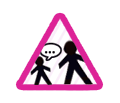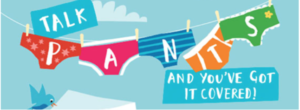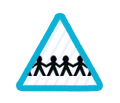Advice for Children and Young People on Staying Safe
If you are a child or young person, this part of the website is for you. We can help if:
- You are being mistreated or abused by someone and you’re not sure what to do
- You think another child/young person is being mistreated or abused
- You need advice or need to talk to someone
On this page:
How you can keep yourself and your friends safe:

Do not talk to strangers
Report all suspicious behaviour and ‘new adult friends’ to parents/carers |

Walk to and from school in groups
Never leave home without telling your parents/carers where you’re going |

Never accept rides from strangers
Shout loudly if someone is asking you do something you’re not happy about |

Do not take gifts from people you don’t know
Never take shortcuts. Always stick to routes selected by parents/carers, and stay on main roads |

Tell someone you trust if someone is making you feel uncomfortable
If you go out with your friends make sure you stay together, even if you fall out |
Bullying
Bullying won’t stop unless you tell someone who can help.
“They stir things up so people don’t want to be my friend. I’m depressed, annoyed, stressed and keep breaking down in tears. I feel like I’m about to fall apart.” – boy aged 13
Bullies are very cunning and are expert at getting away with it.
We all know that bullying goes on in and out of school, and parents, carers, teachers and other professionals have a duty to take action is they suspect or discover that children are being bullied.
Bullying includes:
- People calling you names
- Making things up to get you into trouble
- Hitting, pinching, biting, pushing and shoving
- Taking things away from you
- Damaging your belongings
- Stealing your money
- Taking your friends away from you
- Cyberbullying
- Spreading rumours
- Threats and intimidation
- Making silent or abusive phone calls
- Bullies can also frighten you so that you don’t want to go to school, so that you pretend to be ill to avoid them
Are you being bullied? Do you know someone who is being bullied?
- Talk to your parent or adult in your family;
- Talk to a Teacher, adult family friend or neighbour;
- Get Advice on website like Safety Net and Bullying UK
The Underwear Rule
Privates are private
Always remember your body belongs to you
No means no
Talk about secrets that upset you
Speak up, someone can help
Always remember that your body belongs to you, and if somebody touches you in a private place tell an adult you trust or talk to ChildLine: You can contact Childline by phone, email, text or via a message board. To phone call 0800 1111. They have a video that shows you what happens when you contact them and lots of ideas and information about keeping safe. Their website is at www.childline.org.uk.
Online Safety
The internet can be fun and a great way to chat, listen to music, and share images or media. But remember to be smart and stay safe!
Keep personal information like your mobile number and your address to yourself. Also make sure to never tell anybody your passwords or any other information you aren’t comfortable sharing. Not all people you meet online are real or honest.
It is important to remember that if you publish a picture or video, anyone can change or share it, and it might be difficult to delete later.
Remember, you can block people you don’t know on social media and messaging apps like Whatsapp and Facebook messenger.
If you find anything that makes you uncomfortable online, tell an adult you trust like a parent or teacher.
For more information on how to stay safe online, check out the following websites:
Running Away
Children and young people run away for a number of reasons. These can include:
- arguments with family
- violence
- problems at school
- pregnancy
- forced marriage
- being in a stressful situation.
Running away isn’t always planned, and you might not be prepared – with no money, warm clothes, or idea about where you can get help. You might feel like there’s nowhere else to turn, but running away to live on the streets is never the answer.
If you’re having problems with your family, in care, or are being abused or neglected, there are ways that you can get support. It can help to talk things through before running away – there might be options you hadn’t thought about.
You could:
- try talking to an adult that you trust about what’s going on
- talk confidentially to Childline, who can listen and support you
- get advice from the Runaway helpline if you’re thinking of running away
Thinking of running away? is a guide for children and young people about the risks of running away and advice on where to find help.
Drug and Alcohol Use
Different people drink and do drugs for different reasons. Some people are curious and want to experiment, whereas other people use alcohol and drugs to escape social or personal issues. Sometimes young people get involved in drinking and drug use because they don’t want to feel left out or they are pressured into it.
When some people take drugs they might experience a short-lived period of feeling happier, more energetic, more relaxed, more empathetic (in tune with others), or of unusual altered perceptions. It can be very tempting to try and re-live these experiences and this might lead people to continue to take drugs.
ru-ok? is Brighton and Hove’s under 19s specialists substance misuse service. They offer free confidential advice and information to young people about their drug and/or alcohol use.
If you want to contact the service, all you have to do is call their number during office hours, Monday-Friday and a worker will speak to you.
Where to find ru-ok?:
ru-ok? The Adolescent Service, 1 Regency Road, Brighton, BN1 2RU
Tel: 01273 293966
e-mail: ru-ok@brighton-hove.gov.uk Website: www.areyouok.org.uk
Self-Harm
If you are self-harming, you might feel lonely, isolated and like you can’t tell anyone about it – but you are not alone. We really encourage you to talk about it, and more importantly about how you’re feeling.
It might feel difficult (maybe even impossible) to start with. Sometimes writing, drawing or painting how you’re feeling can help too, or some of these other distractions.
We’re not saying it will fix everything, but usually it can really help to get it out – it can help you realise what’s going on inside your head and how you’re feeling, as well as helping others to understand why you may be behaving differently.
You could talk to a friend, family member, someone you trust at school, college or university, your GP, youth worker, or counsellor.
Here are some ideas that might help you to start a conversation about how you’re feeling:
- I’m finding (…) really hard right now;
- Can we have a chat about (…);
- I’ve being doing (…) to myself and I don’t know why;
- If you’ve got a moment I could really do with a chat;
- Can I talk to you in private please?
If you’re not quite ready to talk to someone yet, here are four websites where you’ll find information and support:
- Right Here – YMCA Right Here is a health and wellbeing project for 11-25 year olds based in Brighton and Hove. They offer advice and support on looking after yourself, visiting your GP, and self-harm and suicide prevention.
- Find Get Give – a mental health services directory for young people created by YMCA’s Brighton & Hove Right Here project in partnership with other local groups. This site allows users to search for support, share stories about their own mental health and give feedback on services they have used for others to read.
- Self Harm UK – Support for young people affected by self-harm.
- YoungMinds – A leading charity in the UK fighting for young people’s mental health.
It’s important if you’re harming yourself that you keep yourself safe. If you’re worried that you’ve done something serious, call 999 for an ambulance.
Childline
“You can contact Childline about anything. No problem is too big or too small. Whatever your worry it’s better out than in.”
You can contact Childline by phone, email, text or via a message board. To phone call 0800 1111. They have a video that shows you what happens when you contact them and lots of ideas and information about keeping safe. Their website is www.childline.org.uk.






